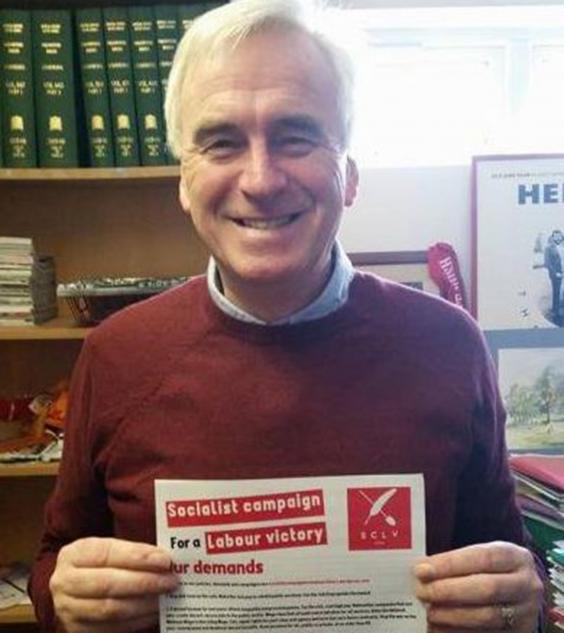Councillors should resist cuts! Speech from Lewisham Momentum meeting
On 9 November, Lewisham for Corbyn – Momentum (a local Corbyn supporters’ group in South London) organised a packed debate on Labour councils and cuts. The two speakers, councillor Luke Sorba and Sacha Ismail, were both Momentum supporters but argued different positions. This is Sacha’s speech.

(Luke Sorba addressing the debate)
After the Tories first came back to office in 2010, some Labour council leaderships talked about campaigning against the cuts in local government spending they imposed. Gradually that faded to almost nothing. More recently Labour councils have kept quiet, not even demanding that a future Labour government restore the funding they have lost – not even in the run up to the general election. So much for seriously wanting to stop cuts!
By and large, the Tories got the cuts they wanted. Some Labour councils did it in a slightly better way, making positive changes around the edges of making cuts, while others went more enthusiastically with the flow. But all Labour councils made massive cuts.
Councils lost about a quarter of their funding during the Coalition government. Now we are facing the same order of attack again, meaning complete social devastation. Either we find a new approach, or Labour councils will be reduced even more purely to local administrators of the Tories’ demolition job on our communities.
Instead Labour councillors should refuse to make cuts, defy the Tories’ plans, and help mobilise the labour movement and the community to defeat them.
There are no guarantees of victory, but both logic and historical examples suggest that such a struggle could be successful. Moreover, the risks are smaller than they once were, and while the Tories would have many advantages in such a battle, our side would have many advantages too.
So far I’ve spoken in quite general terms. Let me explain more concretely.
Sometimes the alternative is described as setting a “deficit budget”. I think that’s misleading or a red herring. Councils can borrow money in the same way individuals can, but unlike central government, they cannot operate in a sustained way on the basis of a deficit, borrowing more or less at will or printing money. Nonetheless, they are large organisations with complex finances which give them quite a bit of leeway. They can cut top management salary and perks and scrap wasteful spending like using agency workers and consultants. They can sell non-service-providing commercial assets. They can juggle accounts to move spending items from one financial year to the next. They can begin to run down reserves.
Obviously, by themselves, such financial gambits are not a long term strategy – they can only buy a relatively short amount of time. The point is that this time could be used to mobilise a fight. Councillors should mobilise alongside council and other workers, council tenants and the wider community in a campaign to demand the funding taken in cuts is restored.
If the council took a lead, the response would almost certainly be very big. Demonstrations, strikes, rent strikes, residents withholding council tax, the council withholding certain payments to the government and many other things could all be tried. The aim should be mounting pressure to force concessions from the Tories, push them to back down, and create the best possible conditions for their replacement by a Labour government committed to fully refunding services.
In place of the current refusal of most councillors to even discuss cuts in their local Labour Parties, councillors should help to build and integrate themselves as a part of a democratic anti-cuts movement which discusses, debates and decides how to pursue and escalate the campaign against the government. They should call a democratic local labour movement conference to discuss what to do. If councillors want to argue there is no option but to accept cuts, why not argue it in the broad movement in the most open possible way?
In my view councillors will have little credibility with workers, tenants and the community unless they themselves take a stand against the government by refusing to vote for cuts. That is why things like cutting top management pay are so important – they would go nowhere near plugging the funding gap, but they would show Labour is politically serious. Unfortunately instead we have Labour councils which continue to pay huge salaries at the top, use consultants, private services, academise schools and so on.
If any significant number of Labour councils defied the Tories in the way I have described, refused to make cuts, and mobilise a big campaign, the government would have to retreat quickly. If even one council took a stand, the Tories would have a serious fight on their hands. And of course, one council taking a stand would make a serious national movement much more likely.
The only two Labour councils in the past which took a strong stand of defiance against a Tory government and stood firm in the face of attempts to crush them – Poplar in East London in the 1920s and
Clay Cross in Derbyshire in the 1970s – both won.
The kind of thing I’m advocating should have been done beginning in 2010-11, but it could still be done now.
What are the risks? No major struggle is risk free but in some respects the risks are smaller than they used to be. The Tories can no longer jail councillors, as they did during the Poplar struggle, or heavily fine and bankrupt them, as they did in Clay Cross.
The Secretary of State for Local Government has wide powers to send in commissioners to try to take over and run a council. This is often presented as a terrible threat – it is argued or implied that commissioners would wreck services which Labour councillors are currently protecting. I think this is highly dubious – firstly because in fact Labour councils are currently carrying out the big bulk of the cuts the Tories want anyway, and secondly because in fact such commissioners would not be in a strong position.
Imagine unelected commissioners being sent by the Tories to take over a Labour council elected with a massive majority, attempting to impose cuts on defiant councillors and council workers, and a mobilised local community. If they did send commissioners, which they might well be reluctant to do, the resulting situation could be very difficult for them indeed – in fact it might well provoke a wave of even greater defiance and militancy. Remember the response in Lewisham when the Tories’ hatchet men tried to shut down the A&E and maternity unit?
As I said, none of this would be risk free and victory would be far from guaranteed. But the only alternative is passively overseeing and being complicit in devastating damage wreaked on our communities.
One last comment. I think it is very unlikely that any Labour councils or even many councillors will adopt such a stance until there is a groundswell of grassroots support for it in the labour movement and Labour Party. In the first instance that means building a strong anti-cuts movement to fight the cuts regardless of what councillors do, building unity across the left and labour movement in that fight. Secondly it means making the arguments about what councils should do with urgency. As things stand, though, it seems very likely that in the coming year all Labour councils will make cuts and the overwhelming majority of Labour councillors will vote for them. Some on the left will argue that it is therefore necessary to stand council candidates against Labour, for instance as TUSC.
I don’t think that follows at all. Getting a tiny vote and simultaneously excluding yourself from the political battles currently going on in the Labour Party will not help the cause of fighting the cuts. We need to fight the cuts regardless of what Labour councils do, but we also need to fight in the party to demand councillors take a stand as part of that struggle – even if it takes a while to win the argument.


